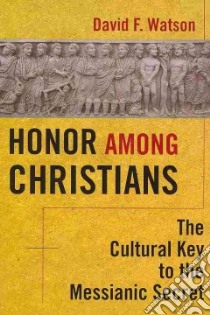Honor Among Christians - 9780800697099
Un libro in lingua di Watson David F. edito da Fortress Pr, 2010
- € 26.80
- Il prezzo è variabile in funzione del cambio della valuta d’origine
Readers have long puzzled over peculiar aspects of the Gospel according to Mark, especially Jesus' attempts to conceal his deeds and his identity. William Wrede famously proposed that Mark had invented the "messianic secret" to explain why the announcement of the arrival of the Son of God had not taken the world by storm; but that proposal has proven more controversial than convincing. Now David F. Watson revisits the "messianic secret," relying not on the Christological concerns of nineteenth- and twentieth-century the theologians but on recent social-scientific insights into the role of honor and shame in ancient Mediterranean culture. The result is a dramatically new understanding of the "messianic secret" and of the broader purpose of the Gospel according to Mark.
"Taking up and refining insights from recent social-scientific exegetical-research on secrecy in the Ancient Mediterranean world, Watson convineingly demonstrates that Wrede's `messianic secret' hypothesis is entirely culturally implausible, Concealment passages in Mark primarity reflect the day-to-day concerns about honor and shame among early believers who would have understood the Gospel to be addressing these issues." John J. Pitch Georgetown University
"In this very useful monograph, David Watson's scholarly soundings into the roles of secrecy in the ancient Mediterranean further illustrate the value of anthropological history. Perhaps now William Wrede's understanding of the `messianic secret' in Mark may finally he laid to rest." Bruce J. Malina Creighton University
"Honor among Christians evinces perhaps the most thorough deployment of cultural anthropelogy for understanding Mark's Gospel that I know, and one of the most sophisticated, Watson convincingly argues that William Wrede's durable prism of `the Messianic secret' has occluded our exegetical vision, which may be corrected by adopting lenses more appropriate to Mark's own social world. The text, not a method, remains focal in Watson's analysis, which opens rather than shuts down a broad range of productive conversation with other interpretive approaches. This is a work of genuine importance chiefly because it illumines how subversive the Second Gospel was in its own place and time---and remains so in our own." C. Clifton Black Otto A. Piper Professor of Biblical Theology Princeton Theological Seminary
Informazioni bibliografiche
- Titolo del Libro in lingua: Honor Among Christians
- Sottotitolo: The Cultural Key to the Messianic Secret
- Lingua: English
- Autore: Watson David F.
- Editore: Fortress Pr
- Collana: Fortress Pr (Paperback)
- Data di Pubblicazione: 01 Ottobre '10
- Genere: RELIGION
- Argomenti : Honor Biblical teaching
- Pagine: 229
- ISBN-10: 080069709X
- EAN-13: 9780800697099


